Figure 29: The simplest, fastest repository for training / finetuning GPT based models. Figure from karpathy/nanoGPT
Prepare Data
$ python3 wordplay/data/shakespeare_char/prepare.pyUsing HF_DATASETS_CACHE=/home/foremans/tmp/polaris-talk/2024-07-17-073327/wordplay/data/shakespeare_char/.cache/huggingfacelength of dataset in characters: 1,115,394all the unique characters:!$&\',-.3:;?ABCDEFGHIJKLMNOPQRSTUVWXYZabcdefghijklmnopqrstuvwxyzvocab size: 65train has 1,003,854 tokensval has 111,540 tokens
This research used resources of the Argonne Leadership Computing Facility, which is a DOE Office of Science User Facility supported under Contract DE-AC02-06CH11357
Wei, Jason, Yi Tay, Rishi Bommasani, Colin Raffel, Barret Zoph, Sebastian Borgeaud, Dani Yogatama, et al. 2022. “Emergent Abilities of Large Language Models.”https://arxiv.org/abs/2206.07682.
Yao, Shunyu, Dian Yu, Jeffrey Zhao, Izhak Shafran, Thomas L. Griffiths, Yuan Cao, and Karthik Narasimhan. 2023. “Tree of Thoughts: Deliberate Problem Solving with Large Language Models.”https://arxiv.org/abs/2305.10601.
---title: "Parallel Training Methods"callout-style: simplelocation: "Intro to AI-driven Science on Supercomputers"location-url: "https://www.alcf.anl.gov/alcf-ai-science-training-series"# location: "[Intro to AI-driven Science on Supercomputers](https://www.alcf.anl.gov/alcf-ai-science-training-series)"date: 2024-11-05date-modified: last-modifiednumber-sections: falseimage: ./assets/thumbnail.pnglightbox: autoeditor: render-on-save: true freeze: autotwitter-card: image: ./assets/thumbnail.png site: "saforem2" creator: "saforem2" title: "Parallel Training Methods for AI" description: "Presented at the Intro to AI-driven Science on Supercomputers training series at the Argonne Leadership Computing Facility." # card-style: summaryopen-graph: title: "Parallel Training Methods for AI" description: "Presented at the Intro to AI-driven Science on Supercomputers training series at the Argonne Leadership Computing Facility." image: "./assets/thumbnail.png"citation: author: Sam Foreman type: speech url: https://samforeman.me/talks/ai-for-science-2024/slides# toc-expand: trueformat: html: # page-layout: full # grid: # body-width: 1000px # # margin-width: 250px # # sidebar-width: 250px # # gutter-width: 1.5rem shift-heading-level-by: 1 image: "./assets/thumbnail.png" mermaid: # layout: elk useMaxWidth: true gfm: shift-heading-level-by: 1 output-file: "ai-for-science-2024.md" revealjs: resources: - ./tetris/ image: "./assets/thumbnail.png" footer: "[samforeman.me/talks/ai-for-science-2024/slides](https://samforeman.me/talks/ai-for-science-2024/slides)" slide-url: https://samforeman.me/talks/ai-for-science-2024/slides.html mermaid: # layout: elk useMaxWidth: true template-partials: - ./title-slide.html title-slide-attributes: data-background-size: contain data-background-iframe: "./tetris/index.html"---# 👀 Overview {background-color="white"}- 📊 Slides @ [samforeman.me/talks/ai-for-science-2024/slides](https://samforeman.me/talks/ai-for-science-2024/slides) - 📄 HTML version: [samforeman.me/talks/ai-for-science-2024](https://samforeman.me/talks/ai-for-science-2024)- {{< fa brands github >}} [argonne-lcf/`ai-science-training-series`](https://github.com/argonne-lcf/ai-science-training-series) - [Series Page](https://www.alcf.anl.gov/alcf-ai-science-training-series)# 📑 Outline {background-color="white"}1. [Scaling: Overview](#scaling-overview)1. [Data Parallel Training](#data-parallel-training) 1. [Communication](#communication) 1. [Why Distributed Training?](#why-distributed-training)1. [Beyond Data Parallelism](#going-beyond-data-parallelism) 1. [Additional Parallelism Strategies](#additional-parallelism-strategies)1. [Large Language Models](#large-language-models)1. [Hands On](#hands-on)# 🚀 Scaling: Overview {background-color="white"}- ✅ **Goal**: - Minimize: [Cost]{.highlight-red} (i.e. amount of time spent training) - Maximize: [Performance]{.highlight-blue} ::: {.callout-note collapse=false icon=false title="📑 Note"} See[🤗 Performance and Scalability](https://huggingface.co/docs/transformers/v4.46.0/performance) for more details :::# 🐢 Training on a Single Device {background-color="white"}- See [🤗 Methods and tools for efficient training on a single GPU](https://huggingface.co/docs/transformers/v4.46.0/perf_train_gpu_one)::: {#fig-single-gpu-1}```{mermaid}flowchart LR subgraph G0["`GPU0`"] subgraph N0["`Network`"] end L0("`Loss`") end subgraph D["`Data`"] x("`x0`") x1("`x1`") x2("`x2`") end x --> N0 N0 --> L0 L0 --> N0classDef block fill:#CCCCCC02,stroke:#838383,stroke-width:1px,color:#838383classDef red fill:#ff8181,stroke:#333,stroke-width:1px,color:#000classDef green fill:#98E6A5,stroke:#333,stroke-width:1px,color:#000classDef blue fill:#7DCAFF,stroke:#333,stroke-width:1px,color:#000classDef grey fill:#cccccc,stroke:#333,stroke-width:1px,color:#000class x,L0 redclass x1, greenclass x2, blueclass x3, greyclass N0,D,G0,n0 block```**SLOW** !! model size limited by GPU memory:::<!-- ::: {.content-visible when-format="revealjs" unless-format="html"} --># Single GPU {background-color="white"}- See [🤗 Methods and tools for efficient training on a single GPU](https://huggingface.co/docs/transformers/v4.46.0/perf_train_gpu_one)::: {#fig-single-gpu-2}```{mermaid}flowchart LR subgraph G0["`GPU0`"] subgraph N0["`Network`"] end L0("`Loss`") end subgraph D["`Data`"] x("`x0`") x1("`x1`") x2("`x2`") end x --> N0 N0 --> L0 L0 --> N0classDef block fill:#CCCCCC02,stroke:#838383,stroke-width:1px,color:#838383classDef red fill:#ff8181,stroke:#333,stroke-width:1px,color:#000classDef grey fill:#cccccc,stroke:#333,stroke-width:1px,color:#000classDef orange fill:#FFC47F,stroke:#333,stroke-width:1px,color:#000classDef yellow fill:#FFFF7F,stroke:#333,stroke-width:1px,color:#000classDef green fill:#98E6A5,stroke:#333,stroke-width:1px,color:#000classDef blue fill:#7DCAFF,stroke:#333,stroke-width:1px,color:#000classDef purple fill:#FFCBE6,stroke:#333,stroke-width:1px,color:#000classDef text fill:#CCCCCC02,stroke:#838383,stroke-width:0px,color:#838383class x,L0 greenclass x1, blueclass x2, yellowclass x3, greyclass N0,D,G0,n0 block```**SLOW** !! model size limited by GPU memory:::# Single GPU {background-color="white"}- See [🤗 Methods and tools for efficient training on a single GPU](https://huggingface.co/docs/transformers/v4.46.0/perf_train_gpu_one)::: {#fig-single-gpu-3}```{mermaid}flowchart LR subgraph G0["`GPU0`"] subgraph N0["`Network`"] end L0("`Loss`") end subgraph D["`Data`"] x("`x₂`") x1("`x₃`") x2("`x₄`") end x --> N0 N0 --> L0 L0 --> N0classDef block fill:#CCCCCC02,stroke:#838383,stroke-width:1px,color:#838383classDef red fill:#ff8181,stroke:#333,stroke-width:1px,color:#000classDef grey fill:#cccccc,stroke:#333,stroke-width:1px,color:#000classDef orange fill:#FFC47F,stroke:#333,stroke-width:1px,color:#000classDef yellow fill:#FFFF7F,stroke:#333,stroke-width:1px,color:#000classDef green fill:#98E6A5,stroke:#333,stroke-width:1px,color:#000classDef blue fill:#7DCAFF,stroke:#333,stroke-width:1px,color:#000classDef purple fill:#FFCBE6,stroke:#333,stroke-width:1px,color:#000classDef text fill:#CCCCCC02,stroke:#838383,stroke-width:0px,color:#838383class x,L0 blueclass x1, yellowclass x2, purpleclass x3, greyclass N0,D,G0,n0 block```**SLOW** !! model size limited by GPU memory:::<!-- ::: --># 🏎️ Training on Multiple GPUs: Data Parallelism {background-color="white"}::: {#fig-ddp-training-mermaid}```{mermaid}flowchart LR subgraph D["`Data`"] direction TB x("`x₀`") x1("`x₁`") x2("`x₂`") end direction LR subgraph G0["`GPU0`"] direction LR subgraph N0["`NN`"] end %%y0("`y₀`") L0["`Loss`"] end subgraph G1["`GPU1`"] direction LR subgraph N1["`NN`"] end L1["`Loss`"] end subgraph G2["`GPU2`"] direction LR subgraph N2["`NN`"] end L2["`Loss`"] end x --> G0 x1 --> G1 x2 --> G2 N0 --> L0 N1 --> L1 N2 --> L2classDef block fill:#CCCCCC02,stroke:#838383,stroke-width:1px,color:#838383classDef text fill:#CCCCCC02,stroke:#838383,stroke-width:0px,color:#838383classDef grey fill:#cccccc,stroke:#333,stroke-width:1px,color:#000classDef red fill:#ff8181,stroke:#333,stroke-width:1px,color:#000classDef orange fill:#FFC47F,stroke:#333,stroke-width:1px,color:#000classDef yellow fill:#FFFF7F,stroke:#333,stroke-width:1px,color:#000classDef green fill:#98E6A5,stroke:#333,stroke-width:1px,color:#000classDef blue fill:#7DCAFF,stroke:#333,stroke-width:1px,color:#000classDef purple fill:#FFCBE6,stroke:#333,stroke-width:1px,color:#000class x,y0,L0 redclass x1,L1 greenclass x2,L2 blueclass x3,ar greyclass D,N0,N1,N2,G0,G1,G2,GU blockclass AR blockclass bc text```Each GPU receives **unique** data at each step:::## Data Parallel: Forward Pass {background-color="white"}::: {#fig-ddp-training-mermaid-allreduce}```{mermaid}flowchart LR subgraph D["`Data`"] direction TB %%xp("`xₙ₊₁`") x("`x₀`") x1("`x₁`") x2("`x₂`") end direction LR subgraph G0["`GPU0`"] direction LR subgraph N0["`NN`"] end %%y0("`y₀`") L0["`Loss`"] end subgraph G1["`GPU1`"] direction LR subgraph N1["`NN`"] end L1["`Loss`"] end subgraph G2["`GPU2`"] direction LR subgraph N2["`NN`"] end L2["`Loss`"] end %% subgraph AR["`Average Grads`"] %% direction TB %% ar("`(∑ₙgₙ)/n`") %% end ar("`Avg. Grads<br>(∑ₙgₙ)/N`") x --> G0 x1 --> G1 x2 --> G2 N0 --> L0 N1 --> L1 N2 --> L2 G0 -.-> ar G1 -.-> ar G2 -.-> arclassDef block fill:#CCCCCC02,stroke:#838383,stroke-width:1px,color:#838383classDef grey fill:#cccccc,stroke:#333,stroke-width:1px,color:#000classDef red fill:#ff8181,stroke:#333,stroke-width:1px,color:#000classDef orange fill:#FFC47F,stroke:#333,stroke-width:1px,color:#000classDef yellow fill:#FFFF7F,stroke:#333,stroke-width:1px,color:#000classDef green fill:#98E6A5,stroke:#333,stroke-width:1px,color:#000classDef blue fill:#7DCAFF,stroke:#333,stroke-width:1px,color:#000classDef purple fill:#FFCBE6,stroke:#333,stroke-width:1px,color:#000classDef text fill:#CCCCCC02,stroke:#838383,stroke-width:0px,color:#838383class x,y0,L0 redclass x1,L1 greenclass x2,L2 blueclass x3,ar greyclass D,N0,N1,N2,G0,G1,G2,GU blockclass AR blockclass bc text```Average gradients across all GPUs:::## Data Parallel: Backward Pass {background-color="white"}::: {#fig-ddp-backward-mermaid}```{mermaid}flowchart RL subgraph D["`Data`"] direction TB x("`x₀`") x1("`x₁`") x2("`x₂`") end subgraph G0["`GPU0`"] direction RL subgraph N0["`NN`"] end L0["`Loss`"] end subgraph G1["`GPU1`"] direction RL subgraph N1["`NN`"] end L1["`Loss`"] end subgraph G2["`GPU2`"] direction RL subgraph N2["`NN`"] end L2["`Loss`"] end subgraph BC["`Send Updates`"] direction TB end BC -.-> G0 BC -.-> G1 BC -.-> G2 L0 ~~~ N0 L1 ~~~ N1 L2 ~~~ N2 G0 ~~~ x G1 ~~~ x1 G2 ~~~ x2classDef grey fill:#cccccc,stroke:#333,stroke-width:1px,color:#000classDef block fill:#CCCCCC02,stroke:#838383,stroke-width:1px,color:#838383classDef red fill:#ff8181,stroke:#333,stroke-width:1px,color:#000classDef orange fill:#FFC47F,stroke:#333,stroke-width:1px,color:#000classDef yellow fill:#FFFF7F,stroke:#333,stroke-width:1px,color:#000classDef green fill:#98E6A5,stroke:#333,stroke-width:1px,color:#000classDef blue fill:#7DCAFF,stroke:#333,stroke-width:1px,color:#000classDef purple fill:#FFCBE6,stroke:#333,stroke-width:1px,color:#000classDef text fill:#CCCCCC02,stroke:#838383,stroke-width:0px,color:#838383class x,y0,L0 redclass x1,L1 greenclass x2,L2 blueclass x3,ar greyclass D,N0,N1,N2,G0,G1,G2,GU blockclass BC blockclass bc text```Send global updates back to each GPU:::## Data Parallel: Full Setup {background-color="white"}::: {#fig-ddp-training}```{mermaid}flowchart LR subgraph D["`Data`"] direction TB x("`x₀`") x1("`x₁`") x2("`x₂`") end direction LR subgraph G0["`GPU0`"] direction LR subgraph N0["`NN`"] end L0["`L0`"] end subgraph G1["`GPU1`"] direction LR subgraph N1["`NN`"] end L1["`L1`"] end subgraph G2["`GPU2`"] direction LR subgraph N2["`NN`"] end L2["`L2`"] end subgraph AR["`Average Grads`"] direction LR ar("`(1/N) ∑ gₙ`") bc("`Update Weights`") ar --> bc end x --> G0 x1 --> G1 x2 --> G2 N0 --> L0 N1 --> L1 N2 --> L2 G0 <-.-> AR G1 <-.-> AR G2 <-.-> ARclassDef block fill:#CCCCCC02,stroke:#838383,stroke-width:1px,color:#838383classDef grey fill:#cccccc,stroke:#333,stroke-width:1px,color:#000classDef red fill:#ff8181,stroke:#333,stroke-width:1px,color:#000classDef orange fill:#FFC47F,stroke:#333,stroke-width:1px,color:#000classDef yellow fill:#FFFF7F,stroke:#333,stroke-width:1px,color:#000classDef green fill:#98E6A5,stroke:#333,stroke-width:1px,color:#000classDef blue fill:#7DCAFF,stroke:#333,stroke-width:1px,color:#000classDef purple fill:#FFCBE6,stroke:#333,stroke-width:1px,color:#000classDef text fill:#CCCCCC02,stroke:#838383,stroke-width:0px,color:#838383class x,y0,L0 redclass x1,L1 greenclass x2,L2 blueclass x3,ar greyclass D,N0,N1,N2,G0,G1,G2,GU blockclass AR blockclass bc text```See: [PyTorch / Distributed Data Parallel](https://pytorch.org/tutorials/intermediate/ddp_tutorial.html):::## Data Parallel: Training {background-color="white"}- Each GPU: - has **identical copy** of model - works on a **unique** subset of data- Easy to get started (minor modifications to code): - {{< fa brands github >}} [saforem2/`ezpz`](https://github.com/saforem2/ezpz) - 🔥 [PyTorch / `DDP`](https://pytorch.org/docs/stable/notes/ddp.html) - 🤗 [HF / `Accelerate`](https://huggingface.co/docs/transformers/accelerate) - {{<iconify logos microsoft-icon >}} [Microsoft / `DeepSpeed`](https://www.deepspeed.ai/)- Requires **global** communication - every rank _must participate_ (collective communication) !!# 🗣️ Communication {background-color="white"}- Need mechanism(s) for communicating across GPUs: - [`mpi4py`](https://mpi4py.readthedocs.io/en/stable/tutorial.html) - [`torch.distributed`](https://pytorch.org/docs/stable/distributed.html)- Collective Communication: - [Nvidia Collective Communications Library (NCCL)](https://developer.nvidia.com/nccl) - [Intel oneAPI Collective Communications Library (oneCCL)](https://www.intel.com/content/www/us/en/developer/tools/oneapi/oneccl.html#gs.gouznn) ::: {.callout-warning collapse=false icon=false title="⌛ Timeouts"} - Collective operations have to be called for each `rank` to form a complete collective operation. - Failure to do so will result in other ranks waiting **indefinitely** :::## AllReduce {background-color="white"}Perform _reductions_ on data (e.g. `sum`, `min`, `max`) across ranks, send result back to everyone.::: {#fig-all-reduce-mermaid}```{mermaid}flowchart TD subgraph R0["`0`"] x0("`x0`") end subgraph R1["`1`"] x1("`x1`") end subgraph R2["`2`"] x2("`x2`") end subgraph R3["`3`"] x3("`x3`") end subgraph AR["`Allreduce`"] xp["`x' = ∑ xₙ `"] end subgraph AR3["`3`"] xp3("`x'`") end subgraph AR2["`2`"] xp2("`x'`") end subgraph AR1["`1`"] xp1("`x'`") end subgraph AR0["`0`"] xp0("`x'`") end x0 --> AR x1 --> AR x2 --> AR x3 --> AR AR --> xp0 AR --> xp1 AR --> xp2 AR --> xp3classDef block fill:#CCCCCC02,stroke:#838383,stroke-width:1px,color:#838383classDef red fill:#ff8181,stroke:#333,stroke-width:1px,color:#000classDef orange fill:#FFC47F,stroke:#333,stroke-width:1px,color:#000classDef yellow fill:#FFFF7F,stroke:#333,stroke-width:1px,color:#000classDef green fill:#98E6A5,stroke:#333,stroke-width:1px,color:#000classDef pink fill:#E599F7,stroke:#333,stroke-width:1px,color:#000classDef blue fill:#7DCAFF,stroke:#333,stroke-width:1px,color:#000classDef purple fill:#FFCBE6,stroke:#333,stroke-width:1px,color:#000class R0,R1,R2,R3,AR,AR0,AR1,AR2,AR3 blockclass xp,xp0,xp1,xp2,xp3, purpleclass x0, redclass x1, greenclass x2, blueclass x3, yellow```All-Reduce operation: each rank receives the reduction of input values across ranks.:::## Reduce {background-color="white"}- Perform a _reduction_ on data across ranks, send to individual::: {#fig-reduce-mermaid}```{mermaid}flowchart TD subgraph R0["`0`"] x0("`x0`") end subgraph R1["`1`"] x1("`x1`") end subgraph R2["`2`"] x2("`x2`") end subgraph R3["`3`"] x3("`x3`") end subgraph AR["`Reduce`"] xp["`x'=reduce(x, 2, SUM)`"] end subgraph AR3["`3`"] end subgraph AR2["`2`"] xp2("`x'`") end subgraph AR1["`1`"] end subgraph AR0["`0`"] end x0 --> AR x1 --> AR x2 --> AR x3 --> AR AR --> AR3 AR --> xp2 AR --> AR1 AR --> AR0classDef block fill:#CCCCCC02,stroke:#838383,stroke-width:1px,color:#838383classDef red fill:#ff8181,stroke:#333,stroke-width:1px,color:#000classDef orange fill:#FFC47F,stroke:#333,stroke-width:1px,color:#000classDef green fill:#98E6A5,stroke:#333,stroke-width:1px,color:#000classDef yellow fill:#FFFF7F,stroke:#333,stroke-width:1px,color:#000classDef blue fill:#7DCAFF,stroke:#333,stroke-width:1px,color:#000classDef purple fill:#FFCBE6,stroke:#333,stroke-width:1px,color:#000classDef pink fill:#E599F7,stroke:#333,stroke-width:1px,color:#000class R0,R1,R2,R3,AR,AR0,AR1,AR2,AR3, blockclass xp,xp2 purpleclass x0, redclass x1, greenclass x2, blueclass x3, yellow```Reduce operation: one rank receives the reduction of input values across ranks:::## Broadcast {background-color="white"}::: {#fig-broadcast-mermaid}```{mermaid}flowchart TD subgraph R3["`3`"] end subgraph R2["`2`"] x2("`x2`") end subgraph R1["`1`"] end subgraph R0["`0`"] end subgraph AR["` `"] xp["`broadcast(x2, 2)`"] end subgraph AR0["`0`"] xp0("`x2`") end subgraph AR1["`1`"] xp1("`x2`") end subgraph AR2["`2`"] xp2("`x2`") end subgraph AR3["`3`"] xp3("`x2`") end x2 --> AR AR --> AR0 AR --> AR1 AR --> AR2 AR --> AR3classDef text fill:#CCCCCC02,stroke:#838383,stroke-width:0px,color:#838383,font-weight:500classDef block fill:#CCCCCC02,stroke:#838383,stroke-width:1px,font-weight:500,color:#838383classDef blue fill:#7DCAFF,stroke:#333,stroke-width:1px,color:#000classDef yellow fill:#FFFF7F,stroke:#333,stroke-width:1px,color:#000class R0,R1,R2,R3,AR0,AR1,AR2,AR3,AR, blockclass x2,xp0,xp1,xp2,xp3 blueclass xp, text````broadcast` (send) a tensor <code>$x$</code> from one rank to all ranks:::## AllGather {background-color="white"}::: {#fig-allgather-mermaid}```{mermaid}flowchart LR subgraph R0["`0`"] x0("`x0`") end subgraph R1["`1`"] x1("`x1`") end subgraph R2["`2`"] x2("`x2`") end subgraph AG["`Allgather`"] %%xp0["`z=[empty_like(x) for _ in range(4)]`"] %%xp1["`dist.all_gather(z, x)`"] end subgraph AG2["`2`"] direction TB xp02("`x0`") xp12("`x1`") xp22("`x2`") end subgraph AG1["`1`"] direction TB xp01("`x0`") xp11("`x1`") xp21("`x2`") end subgraph AG0["`0`"] direction TB xp00("`x0`") xp10("`x1`") xp20("`x2`") end x0 --> AG x1 --> AG x2 --> AG AG --> AG0 AG --> AG1 AG --> AG2classDef red fill:#ff8181,stroke:#333,stroke-width:1px,color:#000classDef orange fill:#FFC47F,stroke:#333,stroke-width:1px,color:#000classDef yellow fill:#FFFF7F,stroke:#333,stroke-width:1px,color:#000classDef green fill:#98E6A5,stroke:#333,stroke-width:1px,color:#000classDef blue fill:#7DCAFF,stroke:#333,stroke-width:1px,color:#000classDef purple fill:#FFCBE6,stroke:#333,stroke-width:1px,color:#000classDef block fill:#CCCCCC02,stroke:#838383,stroke-width:1px,font-weight:500,color:#838383classDef text fill:#CCCCCC02,stroke:#838383,stroke-width:0px,color:#838383class xp0,xp1, textclass AG0,AG1,AG2,AG3,AG,R0,R1,R2,R3, blockclass xp00,xp01,xp02,xp03, redclass xp10,xp11,xp12,xp13, greenclass xp20,xp21,xp22,xp23, blueclass xp30,xp31,xp32,xp33, yellowclass x0, redclass x1, greenclass x2, blueclass x3, yellow```Gathers tensors from the whole group in a list.:::## Scatter {background-color="white"}::: {#fig-scatter-mermaid}```{mermaid}flowchart TD subgraph R3["`3`"] end subgraph R2["`2`"] end subgraph R1["`1`"] direction TB xp0("`x0`") xp1("`x1`") xp2("`x2`") xp3("`x3`") end subgraph R0["`0`"] end subgraph S["`Scatter`"] end subgraph S3["`3`"] x3("`x3`") end subgraph S2["`2`"] x2("`x2`") end subgraph S1["`1`"] x1("`x1`") end subgraph S0["`0`"] x0("`x0`") end R1 --> S S --> S0 S --> S1 S --> S2 S --> S3classDef red fill:#ff8181,stroke:#333,stroke-width:1px,color:#000classDef orange fill:#FFC47F,stroke:#333,stroke-width:1px,color:#000classDef yellow fill:#FFFF7F,stroke:#333,stroke-width:1px,color:#000classDef green fill:#98E6A5,stroke:#333,stroke-width:1px,color:#000classDef blue fill:#7DCAFF,stroke:#333,stroke-width:1px,color:#000classDef purple fill:#FFCBE6,stroke:#333,stroke-width:1px,color:#000classDef block fill:#CCCCCC02,stroke:#838383,stroke-width:1px,font-weight:500,color:#838383class AG0,AG1,AG2,AG3,S,R0,R1,R2,R3,S0,S1,S2,S3, blockclass x0,xp0, redclass x1,xp1, greenclass x2,xp2, blueclass x3,xp3, yellow```Scatters a list of tensors to the whole group:::<!--## AllReduce {background-color="white"}Perform _reductions_ on data (e.g. `sum`, `min`, `max`) across ranks, send result back to everyone.{#fig-all-reduce .r-stretch}## Reduce {background-color="white"}- Perform a _reduction_ on data across ranks, send to individual{#fig-reduce .r-stretch}## Broadcast {background-color="white"}{#fig-broadcast .r-stretch}## AllGather {background-color="white"}{#fig-allgather .r-stretch}## Scatter {background-color="white"}::: {#fig-scatter}{.r-stretch}Scatters a list of tensors to the whole group:::--># Why Distributed Training? {background-color="white"}- `N` workers each processing unique batch[^mbs] of data: - \[`micro_batch_size = 1`\] $\times$ \[`N` GPUs\] $\rightarrow$ [<b><code>global_batch_size = N</code></b>]- Improved gradient estimators - Smooth loss landscape - Less iterations needed for same number of epochs - common to scale learning rate `lr *= sqrt(N)`- See: [Large Batch Training of Convolutional Networks](https://arxiv.org/abs/1708.03888)[^mbs]: `micro_batch_size` = batch_size **per** GPU## Why Distributed Training? Speedup! {background-color="white"}::: {#tbl-recent-progress}| Year | Author | GPU | Batch Size |\# GPU | TIME (s) | ACC || :------:| :--------:| :----:| :----------:| :--------:| :-------:| :------------:|| 2016 | He | P100 | 256 |[8]{.red-bg} |[104,400]{.red-bg} | 75.30% || 2019 | Yamazaki | V100 | 81,920 |[2048]{.blue-bg} |[72]{.blue-bg} | 75.08% |Recent progress {.responsive .striped .hover}:::## Dealing with Data {background-color="white"}- At each training step, we want to ensure that **each worker receives uniquedata**- This can be done in one of two ways: 1. Manually partition data (ahead of time) - Assign **unique subsets** to each worker - Each worker can only see their local portion of the data - Most common approach 2. From each worker, randomly select a mini-batch - Each worker can see the full dataset - ⚠️ When randomly selecting, it is important that each worker uses different seeds to ensure they receive unique data## Broadcast Initial State {background-color="white"}- At the start of training (or when loading from a checkpoint), we want all of our workers to be initialized consistently - **Broadcast** the model and optimizer states from `rank() == 0` worker::: {#fig-broadcast .r-stretch}```{mermaid}flowchart TD0["GPU0"] --> 1["GPU 1"] CKPT --> 00 --> 2["GPU 2"]0 --Model + Optim. State-->3["GPU 3"]0 --> X["`...`"]0 --> N["GPU N"]classDef text fill:#CCCCCC02,stroke:#838383,stroke-width:0px,color:#838383,font-weight:500classDef block fill:#CCCCCC02,stroke:#838383,stroke-width:1px,font-weight:500,color:#838383class 0,1,2,3,N,X,CKPT block```To ensure all workers have the same copies, we load on `RANK==0` and`broadcast`:::## Best Practices {background-color="white"}::: {.callout-important collapse=false icon=false title="⏰ Keeping things in Sync"}**Computation stalls during communication !!**Keeping the communication to computation ratio small is important for effective scaling.:::::: {.flex-container}::: {.column style="width:50%;"}- Use parallel IO whenever possible - Feed each rank from different files - Use MPI IO to have each rank read its own batch from a file - Use several ranks to read data, MPI to scatter to remaining ranks - Most practical in big _at-scale_ training:::::: {.column style="width:50%;"}- Take advantage of data storage - Use [striping on lustre](https://wiki.lustre.org/Configuring_Lustre_File_Striping)- Use the right optimizations for Aurora, Polaris, etc.- Preload data when possible - Offloading to a GPU frees CPU cycles for loading the next batch of data - **minimize IO latency this way**::::::## Going Beyond Data Parallelism {background-color="white"}- ✅ Useful when model fits on single GPU: - ultimately **limited by GPU memory** - model performance limited by size- ⚠️ When model does not fit on a single GPU: - Offloading (can only get you so far...): - {{< iconify logos microsoft-icon >}} [DeepSpeed + `ZeRO`](https://www.deepspeed.ai/tutorials/zero/) - 🔥 [PyTorch + `FSDP`](https://pytorch.org/blog/introducing-pytorch-fully-sharded-data-parallel-api/) - Otherwise, resort to [model parallelism strategies](#additional-parallelism-strategies)## Going beyond Data Parallelism: {{< iconify logos microsoft-icon >}} DeepSpeed + `ZeRO` {background-color="white"}- Depending on the `ZeRO` stage (1, 2, 3), we can offload: 1. **Stage 1**: optimizer states $\left(P_{\mathrm{os}}\right)$ 2. **Stage 2**: gradients + opt. states $\left(P_{\mathrm{os}+\mathrm{g}}\right)$ 3. **Stage 3**: model params + grads + opt. states $\left(P_{\mathrm{os}+\mathrm{g}+\mathrm{p}}\right)$ + [`ZeRO`](https://www.deepspeed.ai/tutorials/zero-offload/)](./assets/zero.png){#fig-zero .r-stretch}## Fully Sharded Data Parallel: 🔥 PyTorch + `FSDP` {.smaller background-color="white"}- Instead of maintaining per-GPU copy of `{params, grads, opt_states}`, FSDP shards (distributes) these across data-parallel workers - can optionally offload the sharded model params to CPU- [Introducing PyTorch Fully Sharded Data Parallel (FSDP) API | PyTorch](https://pytorch.org/blog/introducing-pytorch-fully-sharded-data-parallel-api/)::: {#fig-fsdp}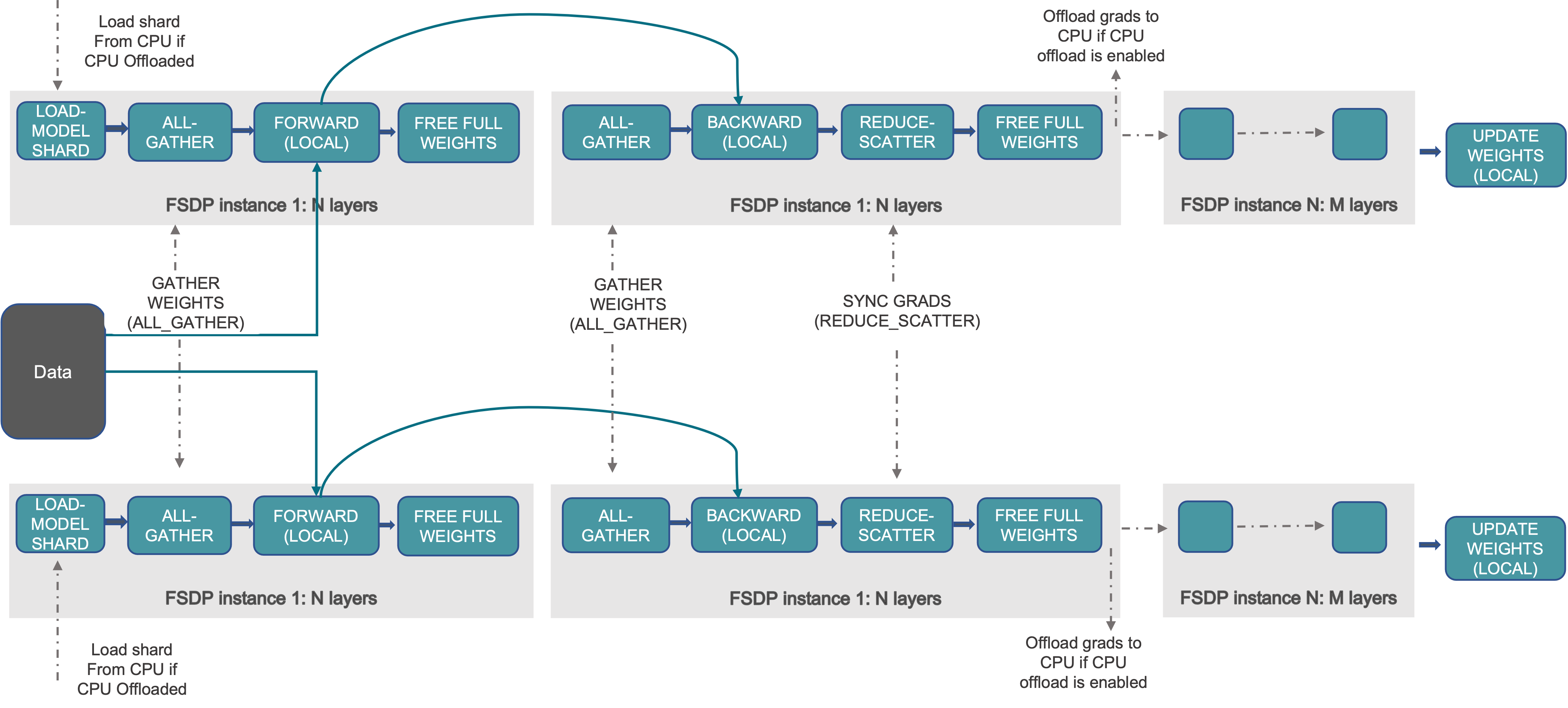FSDP Workflow. [Source](https://pytorch.org/blog/introducing-pytorch-fully-sharded-data-parallel-api/):::# 🕸️ Additional Parallelism Strategies {background-color="white"}- **Tensor (/ Model) Parallelism** (`TP`): - 🤗 [Tensor Parallelism](https://huggingface.co/docs/text-generation-inference/en/conceptual/tensor_parallelism) - 🔥 [Large Scale Transformer model training with Tensor Parallel (TP)](https://pytorch.org/tutorials/intermediate/TP_tutorial.html)- **Pipeline Parallelism** (`PP`): - 🔥 [PyTorch](https://pytorch.org/docs/main/distributed.pipelining.html), {{<iconify logos microsoft-icon >}} [DeepSpeed](https://deepspeed.readthedocs.io/en/latest/pipeline.html)- **Sequence Parallelism** (`SP`): - {{< iconify logos microsoft-icon >}} [DeepSpeed Ulysses](https://github.com/microsoft/DeepSpeed/blob/master/blogs/deepspeed-ulysses/README.md) - [Megatron / Context Parallelism](https://docs.nvidia.com/megatron-core/developer-guide/latest/api-guide/context_parallel.html) - [Unified Sequence Parallel (USP)](https://arxiv.org/abs/2405.07719v3) - {{< fa brands github >}} [feifeibear/`long-context-attention`](https://github.com/feifeibear/long-context-attention)- [x] {{< fa brands github >}} [argonne-lcf/`Megatron-DeepSpeed`](https://github.com/argonne-lcf/Megatron-DeepSpeed) - Supports 4D Parallelism (`DP` + `TP` + `PP` + `SP`)## Pipeline Parallelism (PP) {background-color="white"}::: {.flex-container style="place-content: end space-evenly;"}::: {.column style="width:60%;"}- Model is split up **vertically** (layer-level) across multiple GPUs- Each GPU: - has a portion of the full model - processes _in parallel_ different stages of the pipeline (on a small chunk of the batch)- See: - 🔥 [PyTorch / Pipeline Parallelism](https://pytorch.org/docs/main/distributed.pipelining.html) - {{<iconify logos microsoft-icon >}} [DeepSpeed / Pipeline Parallelism](https://deepspeed.readthedocs.io/en/latest/pipeline.html):::::: {.column style="width:40%;"}::: {#fig-pipeline-parallelism}```{mermaid}flowchart TB subgraph G0["`GPU 0`"] direction LR a0("`Layer 0`") b0("`Layer 1`") end subgraph G1["`GPU 1`"] direction LR a1("`Layer 2`") b1("`Layer 3`") end a0 -.-> b0 b0 --> a1 a1 -.-> b1classDef block fill:#CCCCCC02,stroke:#838383,stroke-width:1px,color:#838383classDef red fill:#ff8181,stroke:#333,stroke-width:1px,color:#000classDef orange fill:#FFC47F,stroke:#333,stroke-width:1px,color:#000classDef yellow fill:#FFFF7F,stroke:#333,stroke-width:1px,color:#000classDef green fill:#98E6A5,stroke:#333,stroke-width:1px,color:#000classDef blue fill:#7DCAFF,stroke:#333,stroke-width:1px,color:#000classDef purple fill:#FFCBE6,stroke:#333,stroke-width:1px,color:#000class G0,G1, blockclass a0, redclass b0, greenclass a1, blueclass b1, yellow```Pipeline Parallelism:::::::::## Tensor Parallel (TP) {background-color="white"}::: {layout="[50,50]"}::: {.column}- Each tensor is split up into multiple chunks- Each shard of the tensor resides on its designated GPU- During processing each shard gets processed separately (and in parallel) on different GPUs - synced at the end of the step- See: [🤗 Model Parallelism](https://huggingface.co/docs/transformers/v4.15.0/parallelism) for additional details:::::: {.column}::: {#fig-model-parallel-1}```{mermaid}flowchart LR subgraph G0["`GPU0`"] direction TB a0("`Layer 0`") b0("`Layer 1`") c0("`Layer 2`") d0("`Layer 3`") end subgraph G1["`GPU1`"] direction TB a1("`Layer 0`") b1("`Layer 1`") c1("`Layer 2`") d1("`Layer 3`") end a0 <-.-> a1 b0 <-.-> b1 c0 <-.-> c1 d0 <-.-> d1classDef red fill:#ff8181,stroke:#333,stroke-width:1px,color:#000classDef orange fill:#FFC47F,stroke:#333,stroke-width:1px,color:#000classDef yellow fill:#FFFF7F,stroke:#333,stroke-width:1px,color:#000classDef green fill:#98E6A5,stroke:#333,stroke-width:1px,color:#000classDef blue fill:#7DCAFF,stroke:#333,stroke-width:1px,color:#000classDef purple fill:#FFCBE6,stroke:#333,stroke-width:1px,color:#000classDef block fill:#CCCCCC02,stroke:#838383,stroke-width:1px,color:#838383class G0,G1, blockclass a0,a1 redclass b0,b1 greenclass c0,c1 blueclass d0,d1 yellow```Tensor Parallel Training:::::::::## Tensor Parallel (TP) {background-color="white"}::: {layout="[50,50]"}::: {.column}- Suitable when the model is too large to fit onto a single device (CPU / GPU)- Typically **more complicated** to implement than data parallel training - This is what one may call _horizontal parallelism_ - Communication whenever dataflow between two subsets- {{< fa brands github >}} [`argonne-lcf/Megatron-DeepSpeed`](https://github.com/argonne-lcf/Megatron-DeepSpeed)- 🤗 [`huggingface/nanotron`](https://github.com/huggingface/nanotron):::::: {.column}::: {#fig-model-parallel-1}```{mermaid}flowchart LR subgraph G0["`GPU0`"] direction TB a0("`Layer 0`") b0("`Layer 1`") c0("`Layer 2`") d0("`Layer 3`") end subgraph G1["`GPU1`"] direction TB a1("`Layer 0`") b1("`Layer 1`") c1("`Layer 2`") d1("`Layer 3`") end a0 <-.-> a1 b0 <-.-> b1 c0 <-.-> c1 d0 <-.-> d1classDef red fill:#ff8181,stroke:#333,stroke-width:1px,color:#000classDef orange fill:#FFC47F,stroke:#333,stroke-width:1px,color:#000classDef yellow fill:#FFFF7F,stroke:#333,stroke-width:1px,color:#000classDef green fill:#98E6A5,stroke:#333,stroke-width:1px,color:#000classDef blue fill:#7DCAFF,stroke:#333,stroke-width:1px,color:#000classDef purple fill:#FFCBE6,stroke:#333,stroke-width:1px,color:#000classDef block fill:#CCCCCC02,stroke:#838383,stroke-width:1px,color:#838383class G0,G1, blockclass a0,a1 redclass b0,b1 greenclass c0,c1 blueclass d0,d1 yellow```Tensor Parallel Training:::::::::::: {.notes}- Split up network over multiple workers- Each receives disjoint subset- All communication associated with subsets are distributed- Communication whenever dataflow between two subsets- Typically **more complicated** to implement than data parallel training- Suitable when the model is too large to fit onto a single device (CPU / GPU):::# Tensor (/ Model) Parallel Training: Example {background-color="white"}Want to compute: $y = \sum_{i} x_{i} W_{i} = x_0 * W_0 + x_1 * W_1 + x_2 * W_2$ where each GPU only has only its portion of the full weights as shown below1. Compute: $y_{0} = x_{0} * W_{0}\rightarrow$ `GPU1`2. Compute: $y_{1} = y_{0} + x_{1} * W_{1}\rightarrow$ `GPU2`3. Compute: $y = y_{1} + x_{2} * W_{2} = \sum_{i} x_{i} W_{i}$ ✅::: {#fig-tensor-parallel-example style="width:75%; margin-left: auto; margin-right: auto; text-align:center;"}```{mermaid}flowchart LR subgraph X0["`GPU0`"] direction LR a("`W0`") end subgraph X1["`GPU1`"] direction LR b("`W1`") end subgraph X2["`GPU2`"] direction LR c("`W2`") end t0("`x₀`")-->X0 X0 -->|"`x₀ W₀`"|X1 X1 -->|"`x₀ W₀ <br>+ x₁ W₁`"|X2 t1("`x₁`") --> X1 t2("`x₂`") --> X2```:::## Tensor (Model) Parallelism[^efficient-large-scale] {background-color="white"}- In **Tensor Paralleism** each GPU processes only a slice of a tensor and onlyaggregates the full tensor for operations that require the whole thing. - The main building block of any transformer is a fully connected`nn.Linear` followed by a nonlinear activation GeLU. - `Y = GeLU(XA)`, where X and Y are the input and output vectors, and A is the weight matrix. - If we look at the computation in matrix form, it’s easy to see how the matrix multiplication can be split between multiple GPUs:[^efficient-large-scale]: [Efficient Large-Scale Language Model Training on GPU Clusters](https://arxiv.org/abs/2104.04473)## Tensor Parallelism {background-color="white"}::: {#fig-parallel-gemm style="max-width: 80%; margin-left: auto; margin-right: auto;"}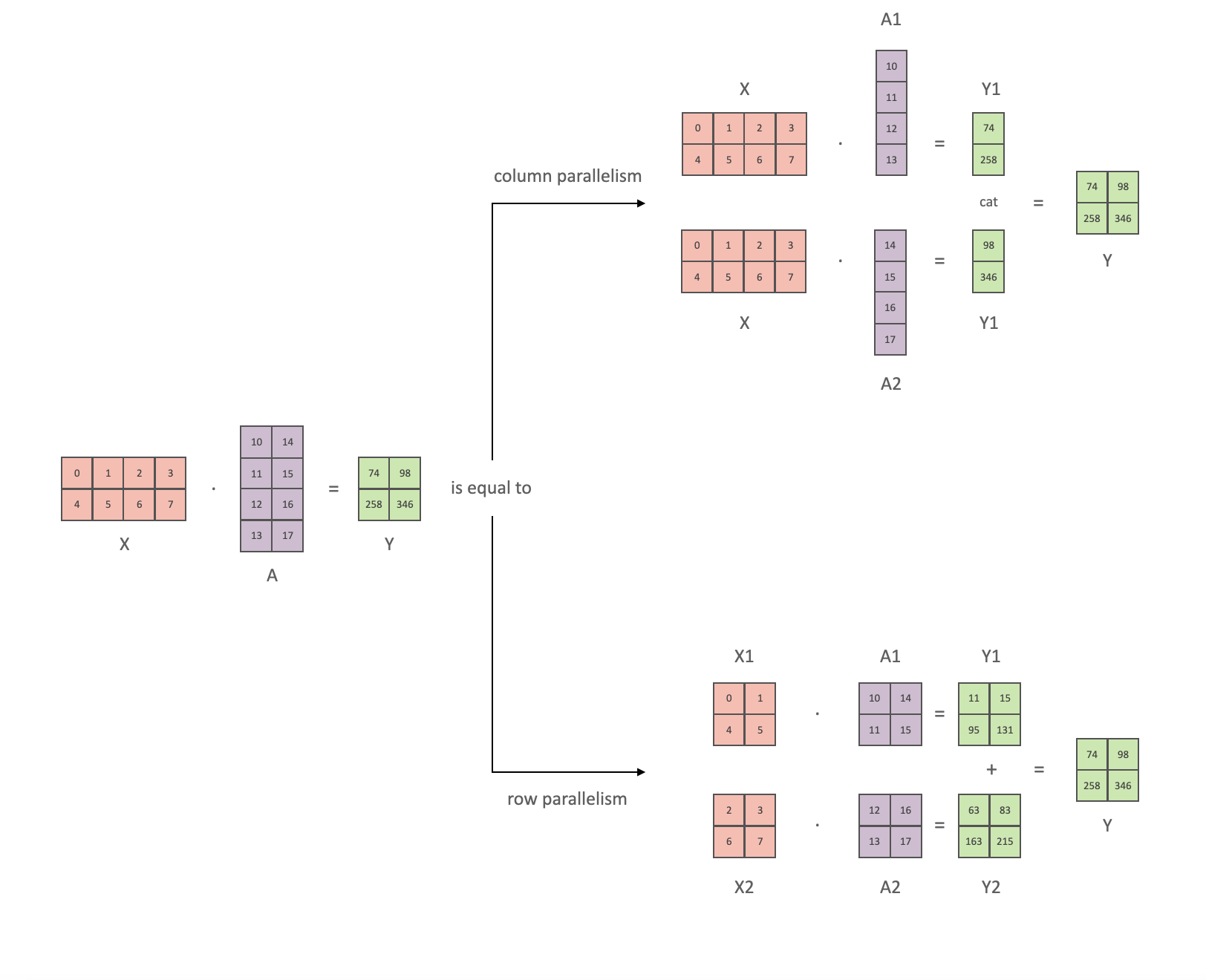Tensor Parallel GEMM. This information is based on (the much more in-depth)[TP Overview](https://github.com/huggingface/transformers/issues/10321#issuecomment-783543530) by [\@anton-l](https://github.com/anton-l):::## 3D Parallelism {background-color="white"}- `DP` + `TP` + `PP` (3D) Parallelism::: {#fig-3dparallel style="text-align:center!important;"}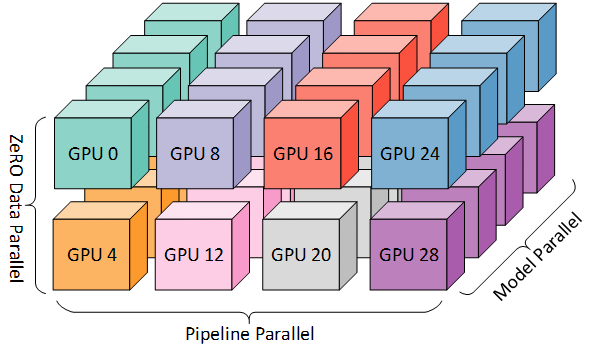Figure taken from [3D parallelism: Scaling to trillion-parametermodels](https://www.microsoft.com/en-us/research/blog/deepspeed-extreme-scale-model-training-for-everyone/):::## Deciding on a Parallelism Strategy {background-color="white"}::: {.panel-tabset}### Single GPU- Model fits onto a single GPU: - Normal use- Model **DOES NOT** fit on a single GPU: - `ZeRO` + Offload CPU (or, optionally, `NVMe`)- Largest layer **DOES NOT** fit on a single GPU: - `ZeRO` + Enable [Memory Centric Tiling (MCT)](https://deepspeed.readthedocs.io/en/latest/zero3.html#memory-centric-tiling) - MCT Allows running of arbitrarily large layers by automatically splitting them and executing them sequentially.### Single Node / Multi-GPU::: {.flex-container}::: {.column}- Model fits onto a single GPU - [`DDP`](https://pytorch.org/docs/stable/notes/ddp.html) - [`ZeRO`](https://deepspeed.readthedocs.io/en/latest/zero3.html):::::: {.column}- Model **DOES NOT** fit onto a single GPU 1. [Pipeline Parallelism (`PP`)](https://www.deepspeed.ai/tutorials/pipeline/) 2. [`ZeRO`](https://deepspeed.readthedocs.io/en/latest/zero3.html) 3. [Tensor Parallelism (`TP`)](https://pytorch.org/docs/stable/distributed.tensor.parallel.html)::::::- With sufficiently fast connectivity between nodes, these three strategies should be comparable. - Otherwise, `PP` > `ZeRO` $\simeq$ `TP`.### Multi-Node / Multi-GPU- When you have fast inter-node connectivity: - `ZeRO` (virtually **NO** modifications) - `PP` + `ZeRO` + `TP` + `DP` (less communication, at the cost of **MAJOR** modifications) - when you have slow inter-node connectivity and still low on GPU memory:```bashDP + PP + TP + ZeRO-1``` - **NOTE**: `TP` is almost _always_ used within a single node, e.g. `TP <= GPUS_PER_NODE`:::# 🦙 Large Language Models {background-color="white"}::: {#fig-llms}Large Language Models have (LLM)s have taken the ~~NLP community~~ **world** by storm[^llm-animation]. :::[^llm-animation]: Source: [{{< fa brands github >}} `Hannibal046/Awesome-LLM`](https://github.com/Hannibal046/Awesome-LLM)## 🔮 Emergent Abilities {background-color="#FBFBFD"}::: {#fig-emergent-abilities}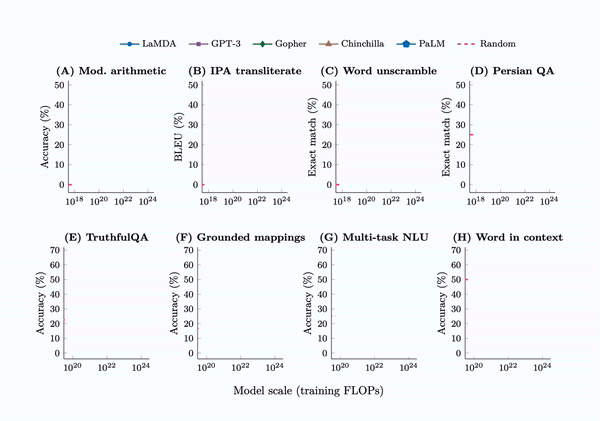See @wei2022emergentabilitieslargelanguage, @yao2023tree:::## 🚂 Training LLMs {.smaller background-color="white"}::: {layout="[15,-2,10]" layout-valign="bottom"}](./assets/evolution.gif)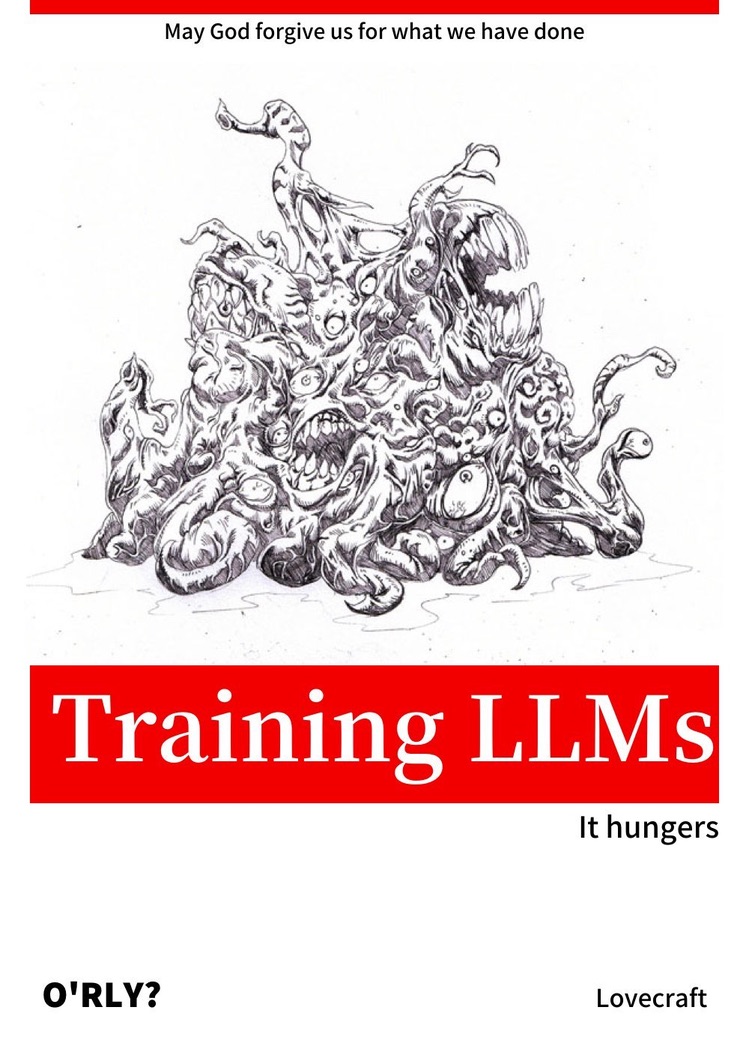:::## ♻️ Life-Cycle of the LLM {auto-animate=true background-color="white"}::: {.flex-container}::: {.column style="width: 40%;"}1. Data collection + preprocessing2. **Pre-training** - Architecture decisions, model size, etc.3. Supervised Fine-Tuning - Instruction Tuning - Alignment4. Deploy (+ monitor, re-evaluate, etc.):::::: {.column style="width:50%;"}::: {#fig-pretrain-two}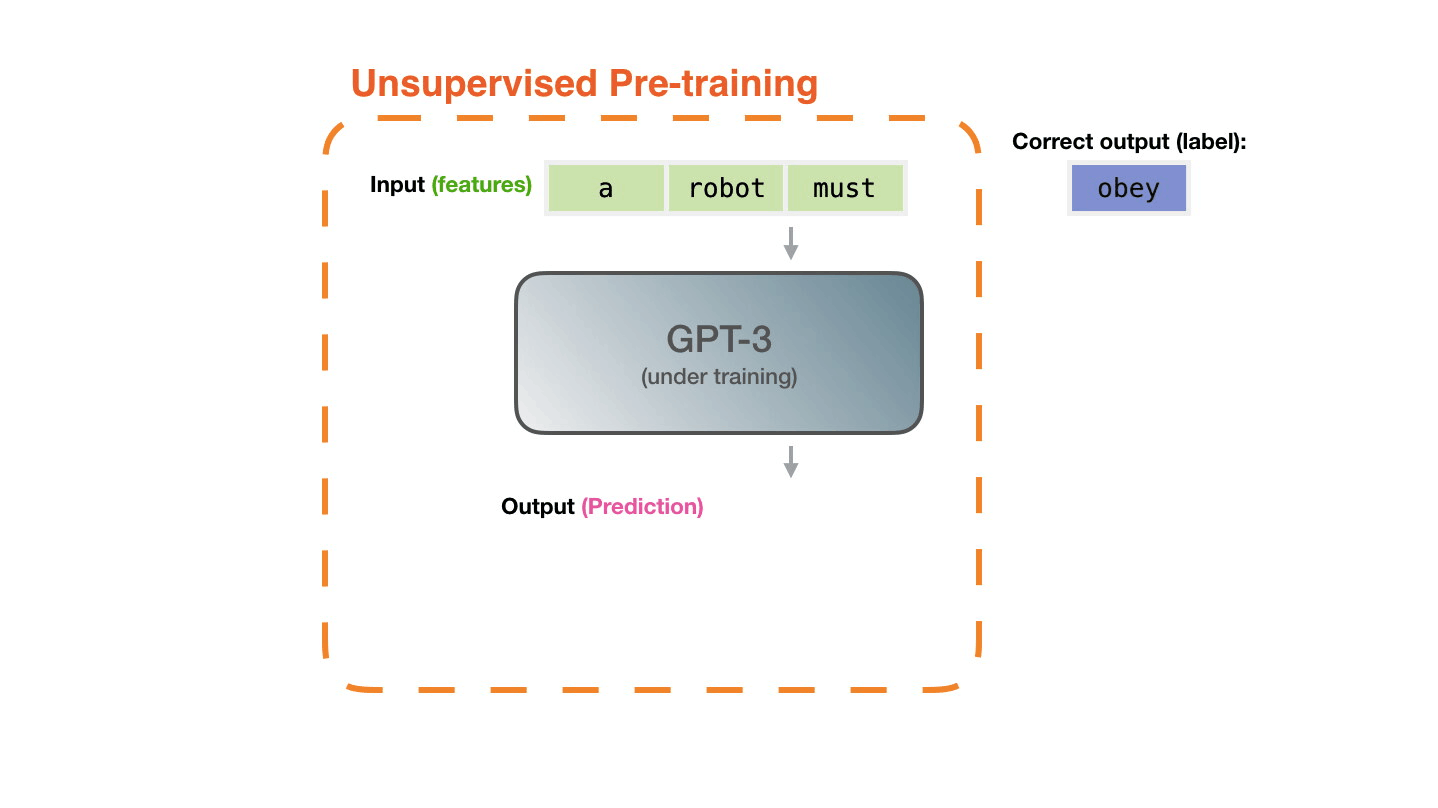**Pre-training**: Virtually _all of the compute_ used during pre-training[^pretrain-two-source].:::::::::[^pretrain-two-source]: Figure from [The Illustrated Transformer](http://jalammar.github.io/illustrated-transformer/)## 🎀 Life-Cycle of the LLM {auto-animate=true background-color="white"}::: {.flex-container}::: {.column style="width: 50%;"}1. Data collection + preprocessing2. Pre-training - Architecture decisions, model size, etc.3. **Supervised Fine-Tuning** - Instruction Tuning - Alignment4. Deploy (+ monitor, re-evaluate, etc.):::::: {.column style="width:50%;"}::: {#fig-finetune-lifecycle}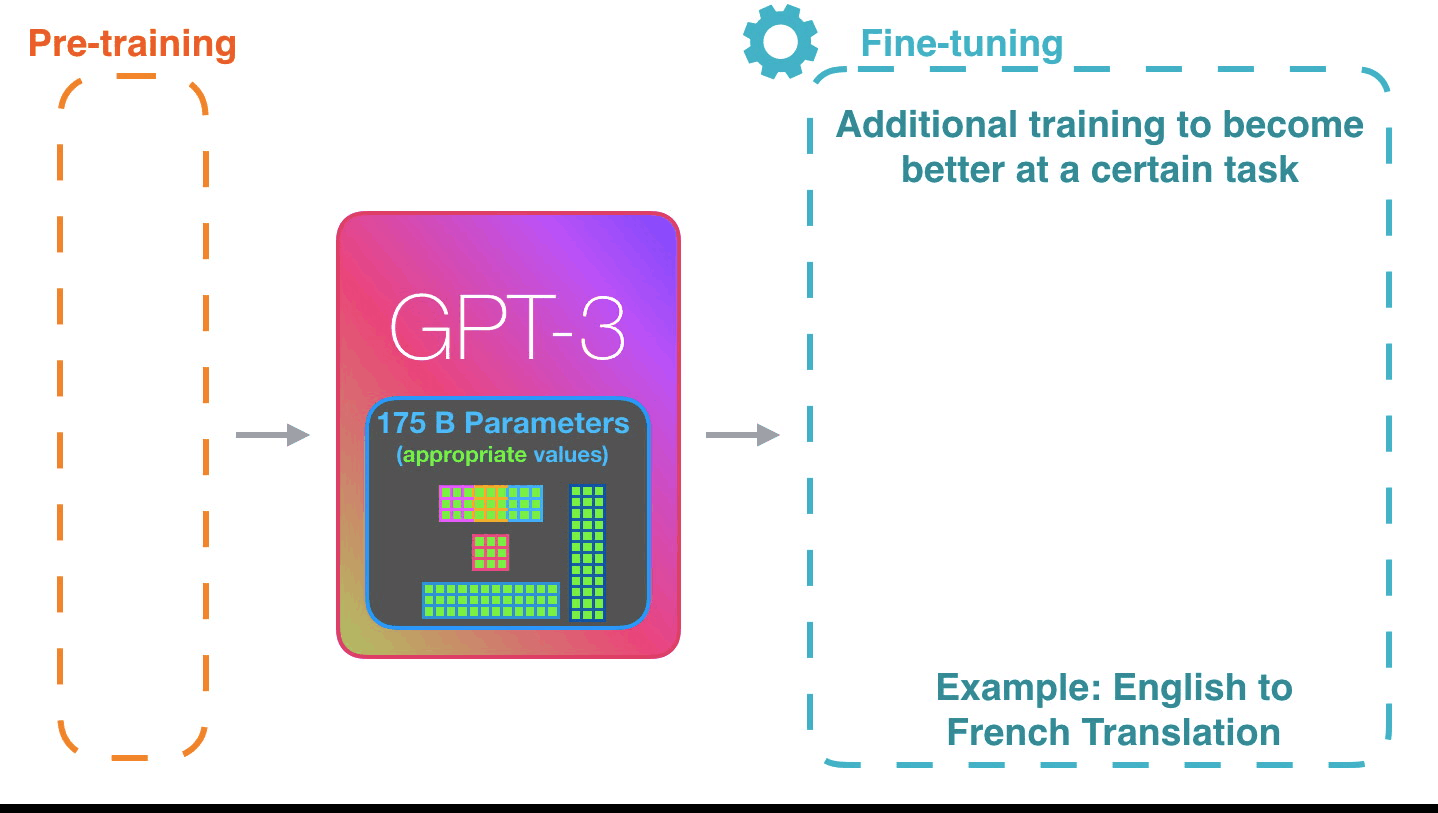**Fine-tuning**: Fine-tuning actually updates the model's weights to make themodel better at a certain task[^ill-transf1].:::::::::[^ill-transf1]: Figure from [The Illustrated Transformer](http://jalammar.github.io/illustrated-transformer/)## ⏩ Forward Pass {background-color="white"}::: {#fig-hf-assisted-generation style="width:100%;"}Language Model trained for causal language modeling[^hf-assisted-generation].:::[^hf-assisted-generation]: Video from: [🤗 Generation with LLMs](https://huggingface.co/docs/transformers/main/en/llm_tutorial)## 💬 Generating Text {background-color="white"}::: {#fig-generating-text style="width: 100%;"}Language Model trained for causal language modeling[^generating-text-source].:::[^generating-text-source]: Video from: [🤗 Generation with LLMs](https://huggingface.co/docs/transformers/main/en/llm_tutorial)# 👋 Hands On {background-color="white"}{{< fa brands github >}} [ai-science-training-series / 06_parallel_training](https://github.com/argonne-lcf/ai-science-training-series/tree/main/06_parallel_training#hands-on)## 🧑💻 Hands On: Getting Started {background-color="white"}1. 🌱 Clone Repo(s): - {{< fa brands github >}} [saforem2/`wordplay`](https://github.com/saforem2/wordplay)```bashgit clone https://github.com/saforem2/wordplaycd wordplay``` - {{< fa brands github >}} [saforem2/`ezpz`](https://github.com/saforem2/ezpz)```bashgit clone https://github.com/saforem2/ezpz deps/ezpz```1. 🐍 Setup Python:```bashexportPBS_O_WORKDIR=$(pwd)&&source deps/ezpz/src/ezpz/bin/utils.shezpz_setup_pythonezpz_setup_job```## 📦 Install {`ezpz`, `wordplay`} {background-color="white"}1. Install Python packages: 1. {{< fa brands github >}} [saforem2/`ezpz`](https://github.com/saforem2/ezpz):```bashpython3-m pip install -e"./deps/ezpz"--require-virtualenv``` 1. {{< fa brands github >}} [saforem2/`wordplay`](https://github.com/saforem2/ezpz):```bash# from inside `wordplay/`python3-m pip install -e . --require-virtualenv```1. Test distributed setup:```bashmpirun-n"${NGPUS}" python3 -m ezpz.test_dist``` See: 🍋 [`ezpz/test_dist.py`](https://github.com/saforem2/ezpz/blob/main/src/ezpz/test_dist.py)## {{< fa brands github >}} [`ezpz`](https://github.com/saforem2/ezpz): Example \[[video](https://asciinema.org/a/668460)\] {background-color="#121314"}::: {#fig-ezpz-asciinema}<script src="https://asciinema.org/a/668460.js" id="asciicast-668460" async="true"></script>Example: using [🍋 `ezpz.test_dist`](https://github.com/saforem2/ezpz/blob/main/src/ezpz/test_dist.py)to train a small model using DDP:::## Install [`wordplay` 🎮💬 ](https://github.com/saforem2/wordplay) {background-color="white"}::: {#fig-nanoGPT}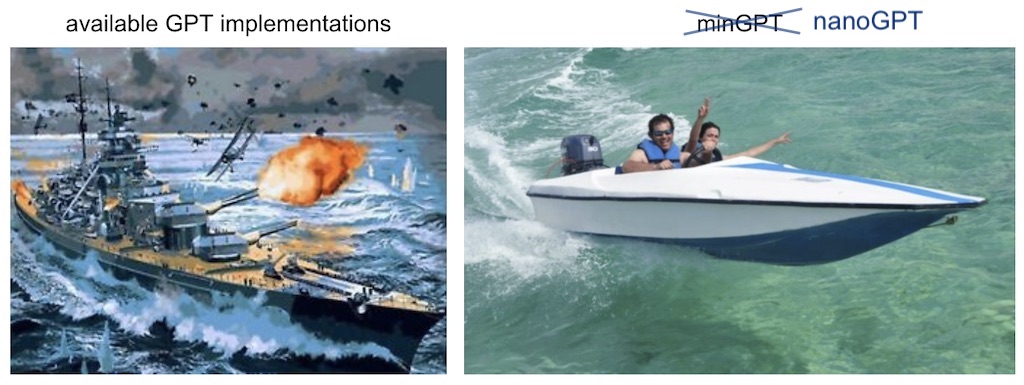The simplest, fastest repository for training / finetuning GPT based models.Figure from [karpathy/`nanoGPT`](https://github.com/karpathy/nanoGPT):::## Prepare Data {background-color="white"}```bash$ python3 wordplay/data/shakespeare_char/prepare.pyUsing HF_DATASETS_CACHE=/home/foremans/tmp/polaris-talk/2024-07-17-073327/wordplay/data/shakespeare_char/.cache/huggingfacelength of dataset in characters: 1,115,394all the unique characters:!$&\',-.3:;?ABCDEFGHIJKLMNOPQRSTUVWXYZabcdefghijklmnopqrstuvwxyzvocab size: 65train has 1,003,854 tokensval has 111,540 tokens```## Launch Training (DDP) {background-color="white"}```bashlaunch python3 -m wordplay \ train.backend=DDP \ train.eval_interval=100 \ data=shakespeare \ train.dtype=bf16 \ model.batch_size=64 \ model.block_size=1024 \ train.max_iters=1000 \ train.log_interval=10 \ train.compile=false \|tee wordplay-gpt2-DDP.log```## Training: Example Output {background-color="white"}```bash$ launch python3 -m wordplay \ train.backend=DDP \ train.eval_interval=100 \ data=shakespeare \ train.dtype=bf16 \ model.batch_size=64 \ model.block_size=1024 \ train.max_iters=1000 \ train.log_interval=10 \ train.compile=false \|tee wordplay-gpt2-DDP.log[2024-07-17 07:42:11.746540][INFO][__init__:156]- Setting logging level to 'INFO' on 'RANK == 0'[2024-07-17 07:42:11.748763][INFO][__init__:157]- Setting logging level to 'CRITICAL' on all others 'RANK != 0'[2024-07-17 07:42:11.749453][INFO][__init__:160]- To disable this behavior, and log from ALL ranks (not recommended), set: 'export LOG_FROM_ALL_RANKS=1' in your environment, and re-run.[2024-07-17 07:42:11.772718][INFO][configs:81]- Setting HF_DATASETS_CACHE to /home/foremans/tmp/polaris-talk/2024-07-17-073327/wordplay/.cache/huggingface/datasets[2024-07-17 07:42:15.341532][INFO][dist:358]-[device='cuda'][rank=2/3][local_rank=2/3][node=0/0][2024-07-17 07:42:15.342381][INFO][dist:358]-[device='cuda'][rank=1/3][local_rank=1/3][node=0/0][2024-07-17 07:42:15.342430][INFO][dist:358]-[device='cuda'][rank=3/3][local_rank=3/3][node=0/0][2024-07-17 07:42:15.348657][INFO][dist:95]-[dist_info]:• DEVICE=cuda• DEVICE_ID=cuda:0• DISTRIBUTED_BACKEND=nccl• GPUS_PER_NODE=4• HOSTS=['x3101c0s13b0n0.hsn.cm.polaris.alcf.anl.gov']• HOSTFILE=/var/spool/pbs/aux/2024084.polaris-pbs-01.hsn.cm.polaris.alcf.anl.gov• HOSTNAME=x3101c0s13b0n0.hsn.cm.polaris.alcf.anl.gov• LOCAL_RANK=0• MACHINE=Polaris• NUM_NODES=1• NGPUS=4• NGPUS_AVAILABLE=4• NODE_ID=0• RANK=0• SCHEDULER=PBS• WORLD_SIZE_TOTAL=4• WORLD_SIZE_IN_USE=4• LAUNCH_CMD=mpiexec --verbose--envall-n 4 -ppn 4 --hostfile /var/spool/pbs/aux/2024084.polaris-pbs-01.hsn.cm.polaris.alcf.anl.gov --cpu-bind depth -d 16[2024-07-17 07:42:15.351446][INFO][dist:725]-[0/4] Using device='cuda' with backend='DDP' + 'nccl' for distributed training.[2024-07-17 07:42:15.356169][INFO][dist:358]-[device='cuda'][rank=0/3][local_rank=0/3][node=0/0][2024-07-17 07:42:15.356692][WARNING][dist:364]- Using [4 / 4] available "cuda" devices !![2024-07-17 07:42:15.359571][INFO][configs:317]- Loading val from /home/foremans/tmp/polaris-talk/2024-07-17-073327/wordplay/data/shakespeare_char/val.bin[2024-07-17 07:42:15.360138][INFO][configs:317]- Loading train from /home/foremans/tmp/polaris-talk/2024-07-17-073327/wordplay/data/shakespeare_char/train.bin[2024-07-17 07:42:15.361154][INFO][configs:442]- Tokens per iteration: 262,144[2024-07-17 07:42:15.361574][INFO][configs:465]- Using self.ptdtype=torch.float16 on self.device_type='cuda'[2024-07-17 07:42:15.362002][INFO][configs:471]- Initializing a new model from scratch[2024-07-17 07:42:15.362529][INFO][dist:874]- Setting up wandb from rank: 0[2024-07-17 07:42:15.362896][INFO][dist:875]- Using: WB PROJECT: WordPlay[2024-07-17 07:42:16.451786][INFO][dist:905]- W&B RUN: [still-frog-17](https://wandb.ai/aurora_gpt/WordPlay/runs/6by9vpcj)[2024-07-17 07:42:16.464106][INFO][dist:312]- Updating wandb.run: still-frog-17 config with "DIST_INFO"[2024-07-17 07:42:16.469424][INFO][dist:938]- Running on machine='Polaris'[2024-07-17 07:42:16.471151][WARNING][__main__:89]- {"train": {"framework":"pytorch","backend":"DDP","device": null,"seed": null,"port": null,"ds_config_path": null,"precision": null,"ngpus": null,"use_wandb": true,"eval_interval": 100,"log_interval": 10,"eval_iters": 200,"eval_only": false,"always_save_checkpoint": false,"init_from":"scratch","wandb_project":"WordPlay","max_iters": 1000,"warmup_iters": 100,"dtype":"bf16","compile": false},"model": {"n_layer": 12,"n_head": 12,"n_embd": 768,"batch_size": 64,"block_size": 1024,"activation":"gelu","dropout": 0.0,"bias": false,"vocab_size": 65},"data": {"dataset":"shakespeare_char","out_dir":"out-shakespeare-char","root_path": null},"optimizer": {"gas": 1,"name":"AdamW","learning_rate": 0.0006,"weight_decay": 0.1,"beta1": 0.9,"beta2": 0.95,"grad_clip": 1.0,"decay_lr": true,"lr_decay_iters": 600000,"min_lr": 6e-05}}[2024-07-17 07:42:16.474305][WARNING][__main__:90]- Output dir: /home/foremans/tmp/polaris-talk/outputs/runs/pytorch/DDP/2024-07-17/07-42-13[2024-07-17 07:42:16.474922][INFO][trainer:246]- Initializing a new model from scratch[2024-07-17 07:42:17.258904][INFO][model:255]- number of parameters: 85.00M[2024-07-17 07:42:17.290004][INFO][trainer:264]- Model size: num_params=85003776[2024-07-17 07:42:17.292626][INFO][model:445]- num decayed parameter tensors: 50, with 85,771,008 parameters[2024-07-17 07:42:17.293296][INFO][model:449]- num non-decayed parameter tensors: 25, with 19,200 parameters[2024-07-17 07:42:17.515324][CRITICAL][trainer:316]-"devid='cuda:1'"[2024-07-17 07:42:17.515340][CRITICAL][trainer:316]-"devid='cuda:2'"[2024-07-17 07:42:17.515465][CRITICAL][trainer:316]-"devid='cuda:3'"[2024-07-17 07:42:18.431814][INFO][model:465]- using fused AdamW: True[2024-07-17 07:42:18.432620][CRITICAL][trainer:316]-"devid='cuda:0'"[2024-07-17 07:42:19.951020][INFO][trainer:356]- • self.model=GPT((transformer): ModuleDict((wte): Embedding(65, 768)(wpe): Embedding(1024, 768)(drop): Dropout(p=0.0, inplace=False)(h): ModuleList((0-11): 12 x Block((ln_1): LayerNorm()(attn): CausalSelfAttention((c_attn): Linear(in_features=768, out_features=2304, bias=False)(c_proj): Linear(in_features=768, out_features=768, bias=False)(attn_dropout): Dropout(p=0.0, inplace=False)(resid_dropout): Dropout(p=0.0, inplace=False))(ln_2): LayerNorm()(mlp): MLP((c_fc): Linear(in_features=768, out_features=3072, bias=False)(act_fn): GELU(approximate='none')(c_proj): Linear(in_features=3072, out_features=768, bias=False)(dropout): Dropout(p=0.0, inplace=False))))(ln_f): LayerNorm())(lm_head): Linear(in_features=768, out_features=65, bias=False))[2024-07-17 07:42:19.955340][INFO][trainer:357]- • self.grad_scaler=<torch.cuda.amp.grad_scaler.GradScaler object at 0x145a38f0f090>[2024-07-17 07:42:19.956897][INFO][trainer:358]- • self.model_engine=DistributedDataParallel((module): GPT((transformer): ModuleDict((wte): Embedding(65, 768)(wpe): Embedding(1024, 768)(drop): Dropout(p=0.0, inplace=False)(h): ModuleList((0-11): 12 x Block((ln_1): LayerNorm()(attn): CausalSelfAttention((c_attn): Linear(in_features=768, out_features=2304, bias=False)(c_proj): Linear(in_features=768, out_features=768, bias=False)(attn_dropout): Dropout(p=0.0, inplace=False)(resid_dropout): Dropout(p=0.0, inplace=False))(ln_2): LayerNorm()(mlp): MLP((c_fc): Linear(in_features=768, out_features=3072, bias=False)(act_fn): GELU(approximate='none')(c_proj): Linear(in_features=3072, out_features=768, bias=False)(dropout): Dropout(p=0.0, inplace=False))))(ln_f): LayerNorm())(lm_head): Linear(in_features=768, out_features=65, bias=False)))[2024-07-17 07:42:19.961066][INFO][trainer:359]- • self.optimizer=AdamW (Parameter Group 0amsgrad: Falsebetas:(0.9, 0.95)capturable: Falsedifferentiable: Falseeps: 1e-08foreach: Nonefused: Truelr: 0.0006maximize: Falseweight_decay: 0.1Parameter Group 1amsgrad: Falsebetas:(0.9, 0.95)capturable: Falsedifferentiable: Falseeps: 1e-08foreach: Nonefused: Truelr: 0.0006maximize: Falseweight_decay: 0.0)[2024-07-17 07:42:19.988827][INFO][trainer:802]- Startup time: 6.7125Training Legend┏━━━━━━━━━━━━━┳━━━━━━━━━━━━━━━━━━━━━━━━━━━━━━━━┓┃ abbr ┃ desc ┃┡━━━━━━━━━━━━━╇━━━━━━━━━━━━━━━━━━━━━━━━━━━━━━━━┩│ step │ Current training iteration ││ loss │ Loss value ││ dt │ Elapsed time per training step ││ dtf │ Elapsed time per forward step ││ dtb │ Elapsed time per backward step ││ sps │ Samples per second ││ sps_per_gpu │ Samples per second (per GPU)││ tps │ Tokens per second ││ tps_per_gpu │ Tokens per second (per GPU)││ mfu │ Model flops utilization ││ train_loss │ Training loss value ││ val_loss │ Validation loss value │└─────────────┴────────────────────────────────┘[2024-07-17 07:42:21.451865][INFO][trainer:820]-['prompt']: 'What is an LLM?'[2024-07-17 07:42:21.452667][INFO][trainer:824]-['response']:What is an LLM?eelEl\'$nltPwBSWal,;PWw bbu\'HiyP\'FWwF &AhW:ygrn kk-\'\'KFlMwnlEfflkc,elpWaWtgml$Pgglhllw lglhFllzczPAFHpeAAPPSltgkrWPPhlEMgcrN ggPWt-WPSSzHSkkrzzk.FFrtSSkgMll&gFXr,hghaueaVPW-pHFF-gg,,,FF,,kbApgg gg\'aWWzzkk\'a\'CggHl$bGeA,FFk,,SF;UF,,aZ;gglee$,k.US&kg:S,,zVzzc[2024-07-17 07:43:01.573073][INFO][trainer:885]- step=10 loss=3.154310 dt=0.282833 dtf=0.005247 dtb=0.011417 sps=14.142633 sps_per_gpu=3.535658 tps=926851.609409 tps_per_gpu=231712.902352 mfu=46.288281 train_loss=4.125778 val_loss=4.128809[2024-07-17 07:43:04.402750][INFO][trainer:885]- step=20 loss=2.660851 dt=0.306263 dtf=0.005233 dtb=0.011419 sps=13.060678 sps_per_gpu=3.265170 tps=855944.613638 tps_per_gpu=213986.153409 mfu=45.934162 train_loss=4.125778 val_loss=4.128809[2024-07-17 07:43:07.237507][INFO][trainer:885]- step=30 loss=2.543283 dt=0.283021 dtf=0.005238 dtb=0.011245 sps=14.133211 sps_per_gpu=3.533303 tps=926234.088226 tps_per_gpu=231558.522057 mfu=45.966490 train_loss=4.125778 val_loss=4.128809[2024-07-17 07:43:10.077248][INFO][trainer:885]- step=40 loss=2.503963 dt=0.285001 dtf=0.005213 dtb=0.011471 sps=14.035061 sps_per_gpu=3.508765 tps=919801.749941 tps_per_gpu=229950.437485 mfu=45.963461 train_loss=4.125778 val_loss=4.128809[2024-07-17 07:43:12.917039][INFO][trainer:885]- step=50 loss=2.477469 dt=0.283532 dtf=0.005166 dtb=0.011294 sps=14.107763 sps_per_gpu=3.526941 tps=924566.380009 tps_per_gpu=231141.595002 mfu=45.984530 train_loss=4.125778 val_loss=4.128809[2024-07-17 07:43:15.760749][INFO][trainer:885]- step=60 loss=2.471083 dt=0.284630 dtf=0.005140 dtb=0.011224 sps=14.053326 sps_per_gpu=3.513332 tps=920998.786204 tps_per_gpu=230249.696551 mfu=45.985675 train_loss=4.125778 val_loss=4.128809[2024-07-17 07:43:18.602785][INFO][trainer:885]- step=70 loss=2.458894 dt=0.283926 dtf=0.005219 dtb=0.010383 sps=14.088155 sps_per_gpu=3.522039 tps=923281.352698 tps_per_gpu=230820.338174 mfu=45.998106 train_loss=4.125778 val_loss=4.128809[2024-07-17 07:43:21.451433][INFO][trainer:885]- step=80 loss=2.489088 dt=0.285537 dtf=0.005183 dtb=0.011373 sps=14.008683 sps_per_gpu=3.502171 tps=918073.060430 tps_per_gpu=229518.265108 mfu=45.983282 train_loss=4.125778 val_loss=4.128809[2024-07-17 07:43:24.302241][INFO][trainer:885]- step=90 loss=2.471990 dt=0.300767 dtf=0.005445 dtb=0.010290 sps=13.299337 sps_per_gpu=3.324834 tps=871585.359388 tps_per_gpu=217896.339847 mfu=45.737774 train_loss=4.125778 val_loss=4.128809[2024-07-17 07:43:27.153275][INFO][trainer:885]- step=100 loss=2.445556 dt=0.285869 dtf=0.005182 dtb=0.011251 sps=13.992403 sps_per_gpu=3.498101 tps=917006.151328 tps_per_gpu=229251.537832 mfu=45.743655 train_loss=4.125778 val_loss=4.128809[2024-07-17 07:43:28.182553][INFO][trainer:820]-['prompt']: 'What is an LLM?'[2024-07-17 07:43:28.183179][INFO][trainer:824]-['response']:What is an LLM?Goupay my winghimithell bls ger t bon sinthard ht omind be,And lereind h py balithand frd oforondof wimon me hageas thinero mand,Thacanes,An frift ghik med d herthecke ntore thack couthen ale, t thit ang d m t h chy me fache ag, wit my hathan glat ng[2024-07-17 07:44:06.025837][INFO][trainer:760]- Saving checkpoint to: /home/foremans/tmp/polaris-talk/outputs/runs/pytorch/DDP/2024-07-17/07-42-13[2024-07-17 07:44:06.026607][INFO][trainer:761]- Saving model to: /home/foremans/tmp/polaris-talk/outputs/runs/pytorch/DDP/2024-07-17/07-42-13/model.pth[2024-07-17 07:44:07.682968][INFO][configs:141]- Appending /home/foremans/tmp/polaris-talk/outputs/runs/pytorch/DDP/2024-07-17/07-42-13 to /home/foremans/tmp/polaris-talk/2024-07-17-073327/wordplay/src/ckpts/checkpoints.log[2024-07-17 07:44:10.519506][INFO][trainer:885]- step=110 loss=2.433923 dt=0.285038 dtf=0.005757 dtb=0.011762 sps=14.033209 sps_per_gpu=3.508302 tps=919680.367894 tps_per_gpu=229920.091974 mfu=45.762304 train_loss=2.439494 val_loss=2.478951[2024-07-17 07:44:13.362148][INFO][trainer:885]- step=120 loss=2.429014 dt=0.284445 dtf=0.005222 dtb=0.011486 sps=14.062460 sps_per_gpu=3.515615 tps=921597.361532 tps_per_gpu=230399.340383 mfu=45.788661 train_loss=2.439494 val_loss=2.478951[2024-07-17 07:44:16.210694][INFO][trainer:885]- step=130 loss=2.402059 dt=0.285559 dtf=0.005199 dtb=0.011765 sps=14.007633 sps_per_gpu=3.501908 tps=918004.211586 tps_per_gpu=229501.052897 mfu=45.794438 train_loss=2.439494 val_loss=2.478951[2024-07-17 07:44:19.061546][INFO][trainer:885]- step=140 loss=2.374062 dt=0.285476 dtf=0.005239 dtb=0.011453 sps=14.011662 sps_per_gpu=3.502916 tps=918268.297093 tps_per_gpu=229567.074273 mfu=45.800956 train_loss=2.439494 val_loss=2.478951[2024-07-17 07:44:21.917283][INFO][trainer:885]- step=150 loss=2.365385 dt=0.285846 dtf=0.005125 dtb=0.011320 sps=13.993568 sps_per_gpu=3.498392 tps=917082.475791 tps_per_gpu=229270.618948 mfu=45.800900 train_loss=2.439494 val_loss=2.478951[2024-07-17 07:44:24.771924][INFO][trainer:885]- step=160 loss=2.317337 dt=0.280788 dtf=0.005173 dtb=0.011249 sps=14.245602 sps_per_gpu=3.561401 tps=933599.792506 tps_per_gpu=233399.948127 mfu=45.883340 train_loss=2.439494 val_loss=2.478951[2024-07-17 07:44:27.626812][INFO][trainer:885]- step=170 loss=2.256231 dt=0.284973 dtf=0.005141 dtb=0.011299 sps=14.036416 sps_per_gpu=3.509104 tps=919890.544506 tps_per_gpu=229972.636126 mfu=45.889069 train_loss=2.439494 val_loss=2.478951[2024-07-17 07:44:30.480952][INFO][trainer:885]- step=180 loss=2.216419 dt=0.286555 dtf=0.005180 dtb=0.011402 sps=13.958906 sps_per_gpu=3.489726 tps=914810.852170 tps_per_gpu=228702.713043 mfu=45.868857 train_loss=2.439494 val_loss=2.478951[2024-07-17 07:44:33.337342][INFO][trainer:885]- step=190 loss=2.145123 dt=0.291456 dtf=0.005409 dtb=0.019347 sps=13.724205 sps_per_gpu=3.431051 tps=899429.467247 tps_per_gpu=224857.366812 mfu=45.773849 train_loss=2.439494 val_loss=2.478951[2024-07-17 07:44:36.194584][INFO][trainer:885]- step=200 loss=2.068149 dt=0.285703 dtf=0.005153 dtb=0.011286 sps=14.000555 sps_per_gpu=3.500139 tps=917540.393411 tps_per_gpu=229385.098353 mfu=45.778791 train_loss=2.439494 val_loss=2.478951[2024-07-17 07:44:37.224149][INFO][trainer:820]-['prompt']: 'What is an LLM?'[2024-07-17 07:44:37.224745][INFO][trainer:824]-['response']:What is an LLM?LORTESS LA:No, sighappat selace? don downd sourciceans note cancen up sof liondThis and my man, werame, of re theeThise not will I on land brond sul me a fingore?FLER:Tisint your not nare lame o igen,-to brorst.SamERS:Sin:I\'l hell she lor hen w[2024-07-17 07:45:14.409129][INFO][trainer:760]- Saving checkpoint to: /home/foremans/tmp/polaris-talk/outputs/runs/pytorch/DDP/2024-07-17/07-42-13[2024-07-17 07:45:14.409820][INFO][trainer:761]- Saving model to: /home/foremans/tmp/polaris-talk/outputs/runs/pytorch/DDP/2024-07-17/07-42-13/model.pth[2024-07-17 07:45:16.366935][INFO][configs:141]- Appending /home/foremans/tmp/polaris-talk/outputs/runs/pytorch/DDP/2024-07-17/07-42-13 to /home/foremans/tmp/polaris-talk/2024-07-17-073327/wordplay/src/ckpts/checkpoints.log[2024-07-17 07:45:19.245061][INFO][trainer:885]- step=210 loss=1.982169 dt=0.283305 dtf=0.005223 dtb=0.011284 sps=14.119042 sps_per_gpu=3.529760 tps=925305.515083 tps_per_gpu=231326.378771 mfu=45.822019 train_loss=2.045786 val_loss=2.148510[2024-07-17 07:45:22.092430][INFO][trainer:885]- step=220 loss=1.897731 dt=0.284759 dtf=0.005217 dtb=0.011187 sps=14.046945 sps_per_gpu=3.511736 tps=920580.608106 tps_per_gpu=230145.152026 mfu=45.837327 train_loss=2.045786 val_loss=2.148510[2024-07-17 07:45:24.942639][INFO][trainer:885]- step=230 loss=1.817213 dt=0.285266 dtf=0.005208 dtb=0.011446 sps=14.022003 sps_per_gpu=3.505501 tps=918945.985503 tps_per_gpu=229736.496376 mfu=45.842940 train_loss=2.045786 val_loss=2.148510[2024-07-17 07:45:27.797910][INFO][trainer:885]- step=240 loss=1.779287 dt=0.285465 dtf=0.005189 dtb=0.011220 sps=14.012250 sps_per_gpu=3.503062 tps=918306.793546 tps_per_gpu=229576.698387 mfu=45.844800 train_loss=2.045786 val_loss=2.148510[2024-07-17 07:45:30.653597][INFO][trainer:885]- step=250 loss=1.704220 dt=0.289284 dtf=0.005471 dtb=0.010346 sps=13.827253 sps_per_gpu=3.456813 tps=906182.836379 tps_per_gpu=226545.709095 mfu=45.785926 train_loss=2.045786 val_loss=2.148510[2024-07-17 07:45:33.512769][INFO][trainer:885]- step=260 loss=1.671318 dt=0.287679 dtf=0.005125 dtb=0.011250 sps=13.904380 sps_per_gpu=3.476095 tps=911237.442617 tps_per_gpu=227809.360654 mfu=45.758182 train_loss=2.045786 val_loss=2.148510[2024-07-17 07:45:36.373461][INFO][trainer:885]- step=270 loss=1.650952 dt=0.298661 dtf=0.005118 dtb=0.011520 sps=13.393107 sps_per_gpu=3.348277 tps=877730.651421 tps_per_gpu=219432.662855 mfu=45.565875 train_loss=2.045786 val_loss=2.148510[2024-07-17 07:45:39.236930][INFO][trainer:885]- step=280 loss=1.573242 dt=0.285970 dtf=0.005171 dtb=0.011290 sps=13.987477 sps_per_gpu=3.496869 tps=916683.279847 tps_per_gpu=229170.819962 mfu=45.587333 train_loss=2.045786 val_loss=2.148510[2024-07-17 07:45:42.100605][INFO][trainer:885]- step=290 loss=1.533265 dt=0.286487 dtf=0.005432 dtb=0.011288 sps=13.962259 sps_per_gpu=3.490565 tps=915030.617828 tps_per_gpu=228757.654457 mfu=45.598392 train_loss=2.045786 val_loss=2.148510[2024-07-17 07:45:44.964424][INFO][trainer:885]- step=300 loss=1.492064 dt=0.288480 dtf=0.005355 dtb=0.011480 sps=13.865774 sps_per_gpu=3.466443 tps=908707.340870 tps_per_gpu=227176.835218 mfu=45.576766 train_loss=2.045786 val_loss=2.148510[2024-07-17 07:45:45.995833][INFO][trainer:820]-['prompt']: 'What is an LLM?'[2024-07-17 07:45:45.996497][INFO][trainer:824]-['response']:What is an LLM?RICHMORD:Char stire? how in those are name the range hone.GLOUCESTER:Nay, in lond's time the palt are worder moreThat wilt in the purpose be a peyAnd thou thine onter hands, and the which broth.ELBOWINCA:At lie my lord with the me an arms be a s[2024-07-17 07:46:23.549987][INFO][trainer:760] - Saving checkpoint to: /home/foremans/tmp/polaris-talk/outputs/runs/pytorch/DDP/2024-07-17/07-42-13[2024-07-17 07:46:23.550696][INFO][trainer:761] - Saving model to: /home/foremans/tmp/polaris-talk/outputs/runs/pytorch/DDP/2024-07-17/07-42-13/model.pth[2024-07-17 07:46:25.496559][INFO][configs:141] - Appending /home/foremans/tmp/polaris-talk/outputs/runs/pytorch/DDP/2024-07-17/07-42-13 to /home/foremans/tmp/polaris-talk/2024-07-17-073327/wordplay/src/ckpts/checkpoints.log[2024-07-17 07:46:28.374854][INFO][trainer:885] - step=310 loss=1.444200 dt=0.299907 dtf=0.005333 dtb=0.010637 sps=13.337481 sps_per_gpu=3.334370 tps=874085.133345 tps_per_gpu=218521.283336 mfu=45.384395 train_loss=1.495372 val_loss=1.713714[2024-07-17 07:46:31.223079][INFO][trainer:885] - step=320 loss=1.429350 dt=0.285238 dtf=0.005245 dtb=0.011485 sps=14.023353 sps_per_gpu=3.505838 tps=919034.479880 tps_per_gpu=229758.619970 mfu=45.435743 train_loss=1.495372 val_loss=1.713714[2024-07-17 07:46:34.074957][INFO][trainer:885] - step=330 loss=1.362220 dt=0.285027 dtf=0.005165 dtb=0.011407 sps=14.033736 sps_per_gpu=3.508434 tps=919714.904826 tps_per_gpu=229928.726207 mfu=45.485355 train_loss=1.495372 val_loss=1.713714[2024-07-17 07:46:36.929464][INFO][trainer:885] - step=340 loss=1.350888 dt=0.284436 dtf=0.005199 dtb=0.011287 sps=14.062893 sps_per_gpu=3.515723 tps=921625.744709 tps_per_gpu=230406.436177 mfu=45.539549 train_loss=1.495372 val_loss=1.713714```## {{< fa brands github >}} [`wordplay`](https://github.com/saforem2/wordplay): Example \[[video](https://asciinema.org/a/668462)\] {background-color="#121314"}::: {#fig-wordplay-asciinema}<script src="https://asciinema.org/a/668462.js" id="asciicast-668462" async="true"></script>Training a LLM to talk like Shakespeare using [saforem2/`wordplay` 🎮💬](https://github.com/saforem2/wordplay):::# ❤️ Thank you! {background-color="white"}- Organizers- Feel free to reach out! <split even> [<i class="fas fa-home"></i>](https://samforeman.me) [<i class="far fa-paper-plane"></i>](mailto:[email protected]) [<i class="fab fa-twitter"></i>](https://www.twitter.com/saforem2) </split>::: {.callout-note icon=false title="Acknowledgements" collapse="false"}This research used resources of the Argonne Leadership Computing Facility,which is a DOE Office of Science User Facility supported under ContractDE-AC02-06CH11357:::# 📓 References {background-color="white"}- Title slide (Tetris animation) from: [emilhvitfeldt/quarto-iframe-examples](https://github.com/emilhvitfeldt/quarto-iframe-examples)